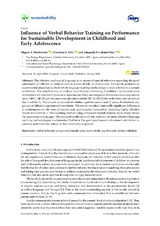Influence of Verbal Behavior Training on Performance for Sustainable Development in Childhood and Early Adolescence
Autor
Maldonado, Miguel Á.
Alós Cívico, Francisco
Povedano-Díaz, Amapola
Editor
MDPIFecha
2020Materia
Verbal behaviorCompound stimuli
Tacts
Intraverbals
Psychosocial factors
Children
METS:
Mostrar el registro METSPREMIS:
Mostrar el registro PREMISMetadatos
Mostrar el registro completo del ítemResumen
The effective teaching of language is an aspect of special relevance regarding the good adjustment of children in contexts such as school, family, or community. This article performs an experimental procedure to check which language teaching methodology is most effective in a sample of children. The objective was to analyze the influence of training, Condition 1 (pure tacts more intraverbal) or Condition 2 (pure tacts more impure tacts), on emergence of two tests involving impure tacts (AB-C, AB-D) and four new complex intraverbals (BC-D, BD-C) for each of two sets of stimuli (Set 1 and Set 2). The sample comprised 54 children aged between 6 and 12 years, divided into two groups of different experimental conditions. The results revealed statistically significant differences in performance on the tests of impure tacts and complex intraverbal, obtaining highly effective results in Condition 2. This teaching method using compound stimuli (impure tacts) clearly favors the expansion of language. The practical implications of this work can be more effective language teaching methodologies implemented that favor the good psychosocial adjustment of children in contexts such as family, school, or the community in general.

